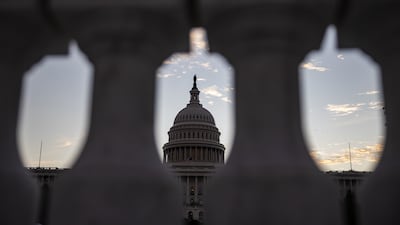Former President Donald Trump filed a lawsuit on Monday against the US congressional committee investigating the deadly January 6 attack on the Capitol, claiming it made an illegal, unfounded and overbroad request for his White House records.
Mr Trump asserted in the lawsuit filed in US District Court for the District of Columbia that materials sought by the January 6 Select Committee are covered by a legal doctrine known as executive privilege, which protects the confidentiality of some communications between White House officials.
The lawsuit seeks an injunction against the panel's request for materials.
Many legal experts have said Mr Trump, as the former president, cannot lawfully use executive privilege to block subpoenas issued by the House committee.
A mob of Trump supporters stormed the seat of Congress on January 6 in a failed bid to prevent the certification of President Joe Biden's election victory. More than 600 people now face criminal charges stemming from the event.
This month, Mr Biden authorised the National Archives, a government agency that holds records from Mr Trump's time in office, to turn over an initial batch of documents requested by the Select Committee.
In addition to Trump White House records, the committee has issued subpoenas demanding evidence from Trump advisers, including political strategist Steve Bannon.
Mr Bannon has refused to provide evidence until Mr Trump's assertion of executive privilege has been resolved by a court or through negotiations with the committee.
The committee said last week it would formally ask the US Justice Department to bring criminal charges against Mr Bannon because of his defiance of the subpoena.































